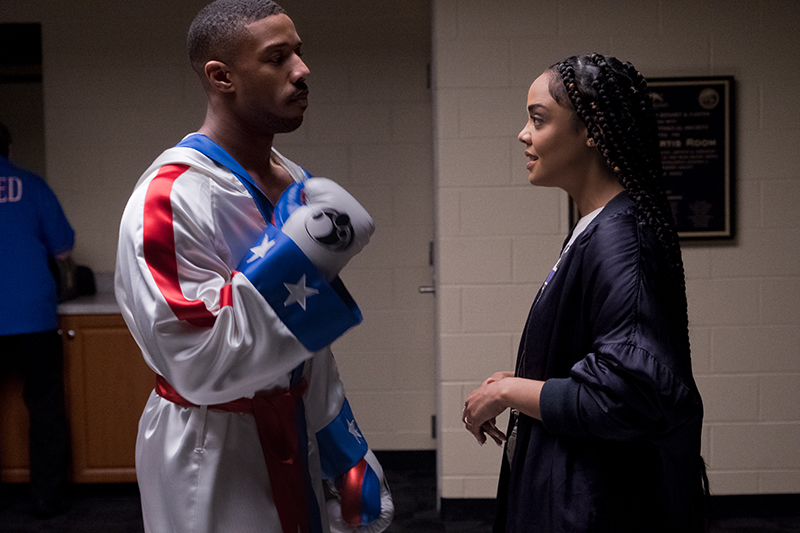Creed II
CREED II has the benefit of hindsight, learning from the mistakes of its predecessors in the ROCKY franchise which, for a time, cartwheeled down a path to self-parody. The sequel rights itself just as Michael B. Jordan’s performance as Killmonger in Ryan Coogler’s BLACK PANTHER opens up new possibilities for the young actor.

Michael B. Jordan stars as Adonis Creed and Tessa Thompson as Bianca in CREED II, a Metro Goldwyn Mayer Pictures and Warner Bros. Pictures film. Photo: Barry Wetcher.

CREED II has the benefit of hindsight, learning from the mistakes of its predecessors in the ROCKY franchise which, for a time, cartwheeled down a path to self-parody. The sequel rights itself just as Michael B. Jordan’s performance as Killmonger in Ryan Coogler’s BLACK PANTHER opens up new possibilities for the young actor.
To defend his title as World Heavyweight Champion, Adonis (Michael B. Jordan) fights Danny “The Stuntman” Wheeler (Andre Ward). In Kiev, Ukraine, sleazy promoter Buddy Marcelle (Russell Hornsby) tracks down Viktor Drago (Florian Munteanu). He persuades him out of the underground circuit and onto the world stage with Creed, whose father Apollo, Ivan (Dolph Lundgren) killed in the ring thirty years earlier. To win back the approval of his country and his wife, Ivan abusively pushes his son.
For the first hour, director Stephen Caple, Jr., and writers Stallone and Juel Taylor take us into familiar territory: The new champion must defend his title or risk the media and public branding him a fluke, a phony. His, and Ivan’s, headstrong hyper-masculinity gets the best of him, pulling them both into a match everyone else wants to see–so we’re told.
Badly injured from the fight, with a child due who might inherit her mother’s, Bianca’s (Tessa Thompson), deafness, the titular hero must find the road back. We foresee a rematch, preceded by a journey to a purposely remote locale where the “hard training” begins, which begs the question, “What were they doing until now?”
Such clichés pop up occasionally; his entire family wears black at the climactic bout as if they’re attending a funeral. However, the filmmakers ultimately throw away the ROCKY sequel playbook. At the midpoint, the late Apollo’s wife, Mary Anne Creed (Phylicia Rashad, glowing with matronly authority), advises Bianca to let Adonis confront the obstacle of his toxic hyper-masculinity himself.
Somewhere, 13 miles above Arizona, there was a pilot screaming inside his space helmet. Then, I heard it. The click of the mic button from the back seat. That was the very moment that I knew Walter and I had become a crew.
– Brian Schul, Sled Driver: Flying The World’s Fastest Jet
Earlier in the film, Adonis’ earlier remark about not being driven any more by Apollo’s voice inside his head serves as an obvious setup for a character arc payoff. A lesser director might have book-ended this literally with a snip from unused audio of Carl Weathers. Instead, at the crucial moment, Caple has Adonis, and us, hear only Bianca’s voice. She is is Obi-Wan, his best friend. This is Caple’s answer to Rocky’s confessional with Adrian. With the love and assurance of someone who has held you in their arms at your weakest, your most vulnerable, everything is possible.
Kramer Morgenthau’s mostly-ringside camera work isn’t nearly as dynamic as Maryse Alberti and Steadicam operator Ben Semanoff’s elegant, hand-held cinematography. Musical cues and slow-motion mostly punctuate the climactic fight. But the interwoven stories of Creed and son, Drago and son, and how they redeem themselves, is of greater import to the overall result here. It’s not quite ROCKY II, but then it’s not ROCKY III, either.
A word about Dolph Lundgren: In a recent interview with The Hollywood Reporter, Lundgren the Fulbright scholar opened up about his father’s abuse and typecasting as Drago, and the resulting marital failure. From here he drew the inspiration to reinvent the series’ most iconic villain as a fallen father repeating the cycle of abuse his Mother Russia inflicted upon him.